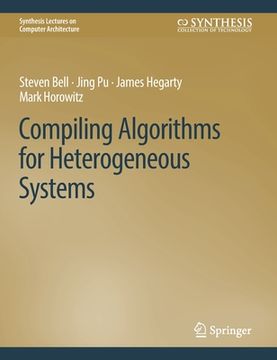Share
Compiling Algorithms for Heterogeneous Systems
James Hegarty
(Author)
·
Steven Bell
(Author)
·
Jing Pu
(Author)
·
Springer
· Hardcover
Compiling Algorithms for Heterogeneous Systems - Bell, Steven ; Pu, Jing ; Hegarty, James
£ 57.84
£ 64.27
You save: £ 6.43
Choose the list to add your product or create one New List
✓ Product added successfully to the Wishlist.
Go to My WishlistsIt will be shipped from our warehouse between
Friday, June 28 and
Monday, July 01.
You will receive it anywhere in United Kingdom between 1 and 3 business days after shipment.
Synopsis "Compiling Algorithms for Heterogeneous Systems"
Most emerging applications in imaging and machine learning must perform immense amounts of computation while holding to strict limits on energy and power. To meet these goals, architects are building increasingly specialized compute engines tailored for these specific tasks. The resulting computer systems are heterogeneous, containing multiple processing cores with wildly different execution models. Unfortunately, the cost of producing this specialized hardware--and the software to control it--is astronomical. Moreover, the task of porting algorithms to these heterogeneous machines typically requires that the algorithm be partitioned across the machine and rewritten for each specific architecture, which is time consuming and prone to error. Over the last several years, the authors have approached this problem using domain-specific languages (DSLs): high-level programming languages customized for specific domains, such as database manipulation, machine learning, or image processing. By giving up generality, these languages are able to provide high-level abstractions to the developer while producing high-performance output. The purpose of this book is to spur the adoption and the creation of domain-specific languages, especially for the task of creating hardware designs. In the first chapter, a short historical journey explains the forces driving computer architecture today. Chapter 2 describes the various methods for producing designs for accelerators, outlining the push for more abstraction and the tools that enable designers to work at a higher conceptual level. From there, Chapter 3 provides a brief introduction to image processing algorithms and hardware design patterns for implementing them. Chapters 4 and 5 describe and compare Darkroom and Halide, two domain-specific languages created for image processing that produce high-performance designs for both FPGAs and CPUs from the same source code, enabling rapid design cycles and quick porting of algorithms. The final section describes how the DSL approach also simplifies the problem of interfacing between application code and the accelerator by generating the driver stack in addition to the accelerator configuration. This book should serve as a useful introduction to domain-specialized computing for computer architecture students and as a primer on domain-specific languages and image processing hardware for those with more experience in the field.
- 0% (0)
- 0% (0)
- 0% (0)
- 0% (0)
- 0% (0)
All books in our catalog are Original.
The book is written in English.
The binding of this edition is Hardcover.
✓ Producto agregado correctamente al carro, Ir a Pagar.

